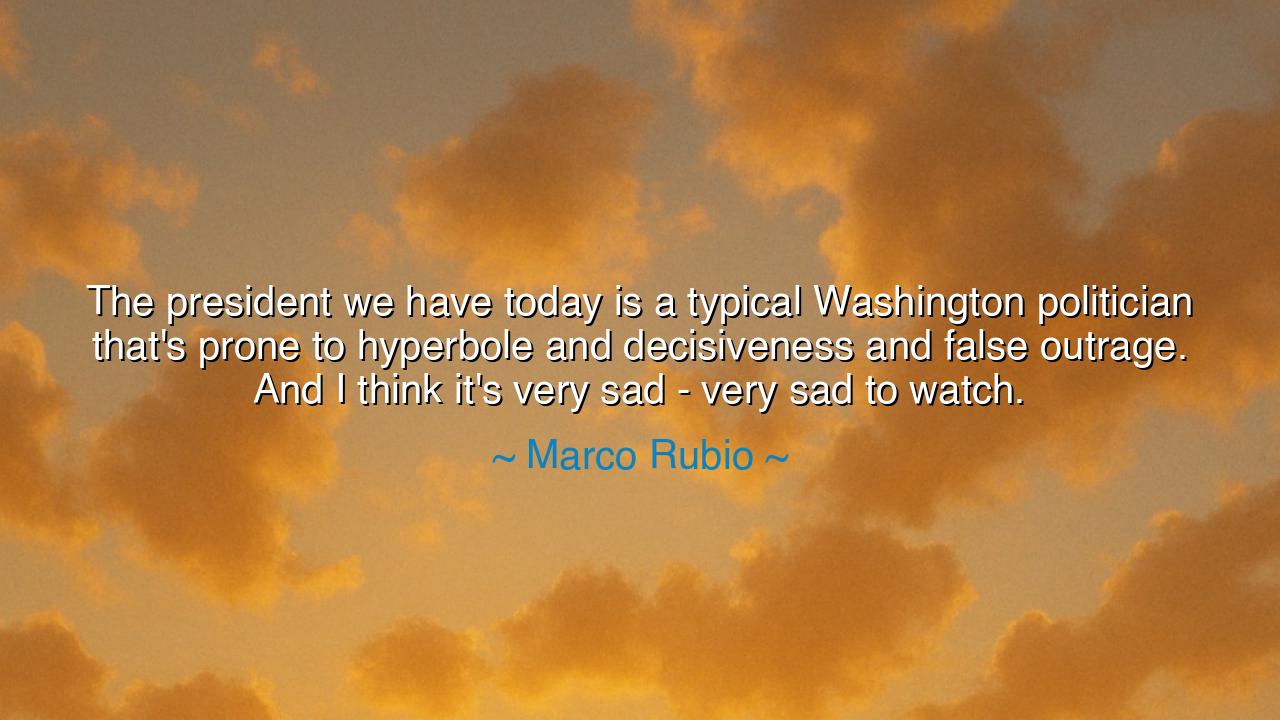
The president we have today is a typical Washington politician
The president we have today is a typical Washington politician that's prone to hyperbole and decisiveness and false outrage. And I think it's very sad - very sad to watch.






There is both lament and warning in the words of Marco Rubio, who said, “The president we have today is a typical Washington politician that’s prone to hyperbole and decisiveness and false outrage. And I think it’s very sad — very sad to watch.” In these words, spoken not merely as criticism but as reflection, lies a sorrow for what leadership has become — a reminder that when truth yields to performance and conviction gives way to ambition, the soul of governance begins to decay. Rubio’s statement is not just about a single man or moment, but about the decline of integrity in public life, a decline as old as power itself. He grieves, as all the wise do, when the noble calling of leadership turns into theater — when truth becomes a tool and not a principle.
The origin of this quote lies in Rubio’s long engagement with American politics — a man shaped by ideals of civic virtue and service, who rose from humble beginnings to the Senate, only to witness the machinery of politics devour its own moral compass. His words reflect the frustration of one who still believes that public service should be guided by honesty, restraint, and dignity, yet sees a world where these virtues are cast aside for spectacle. When he calls the behavior of modern leaders “false outrage,” he names one of the greatest illnesses of our age: the manipulation of emotion for power, outrage without conviction, division without cause.
The ancients knew this disease well. In the last days of Rome, senators once noble in purpose became masters of deceit, flattering crowds and stirring rage to mask their corruption. Cicero, the Roman orator and philosopher, warned that “nothing is more noble than politics when pure, and nothing more vile when corrupt.” His words echo through Rubio’s lament. The politician, when he forgets the weight of his duty, becomes an actor upon a stage — louder than ever, but emptier within. Hyperbole replaces truth; indignation replaces justice; and leadership becomes a performance meant to please the crowd rather than serve the people.
There is a sorrowful irony in Rubio’s tone — for he is not mocking, but mourning. To say “it’s very sad to watch” is to express grief, not merely frustration. He sees what many have seen throughout history: that societies rise when their leaders are humble, and fall when they become proud. The ancient Greeks spoke of hubris — the arrogance that blinds the powerful to their own faults and leads inevitably to downfall. From King Oedipus to Napoleon Bonaparte, history shows the same pattern: the leader who begins in vision ends in vanity, and those who once inspired become consumed by their own reflection. Rubio’s sadness is the sadness of every citizen who loves his country but fears its leaders have forgotten the meaning of stewardship.
Consider the story of Marcus Aurelius, the philosopher-king of Rome, who ruled not by fear or spectacle, but by quiet wisdom. He wrote in his Meditations: “Waste no more time arguing what a good man should be. Be one.” In that single line lies the antidote to Rubio’s lament. The cure for false outrage is genuine virtue; the cure for political theater is personal integrity. If our leaders lived as Aurelius did — mindful, disciplined, devoted to truth — then the age of noise would give way to an age of meaning. But as long as vanity governs, the people will suffer beneath the glittering shadow of deception.
Rubio’s words also hold a lesson for the governed, not just the governors. For leaders do not rise in a vacuum; they mirror the spirit of their people. If citizens reward outrage more than wisdom, exaggeration more than honesty, then they summon leaders who reflect their own appetites. Thus, the sadness he feels is also a mirror to society itself — a reminder that every generation must ask: What kind of truth do we honor? What kind of voice do we follow? Democracy, like the soul, thrives on truth and perishes in falsehood.
The lesson, my children, is clear: seek substance over noise, integrity over image, and truth over comfort. In your leaders, demand not perfection but principle; in yourselves, cultivate discernment. Turn away from the seduction of outrage and return to the discipline of thought. The wise do not shout — they build. The righteous do not perform — they serve. Let every citizen remember that politics, like life, is only as noble as the heart that guides it.
For as Marco Rubio reminds us, there is tragedy in watching greatness descend into spectacle. But there is hope, too — for every era of decay has also given rise to those who restore virtue to power. Be among them. Let your words be measured, your outrage real, your convictions grounded not in ambition but in truth. For in the end, the fate of nations — like the character of men — depends not on the loudest voices, but on the quiet strength of integrity.






AAdministratorAdministrator
Welcome, honored guests. Please leave a comment, we will respond soon